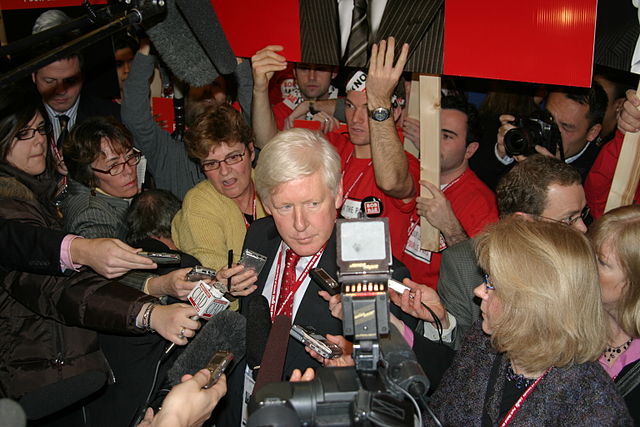Chip in to keep stories like these coming.
The other day, a Facebook friend of mine called Thomas Mulcair a neo-Thatcherite, and the New Democrats an anti-worker political party.
This is only one — slightly cartoonish — voice. But it reflects the frustrations of many among the populist urban left who should be a major base of the NDP.
Dissatisfaction with the NDP’s balanced-budget messaging this election season is growing enough to inspire social media frustration, VICE think pieces and, I hope, a change of course for the party I support.
But I don’t think that change will come. The reason why lies in the peculiar nature of the NDP’s growing pains as it tries to tap into the global anti-austerity movement while calming the anxieties of a socially progressive upper-middle class.
How to alienate a twenty-first century progressive
This disaffected activist and middle-class urban left is plugged into social media for their major sources of news. It has also become their public square.
They are plugged into the ideals of Occupy, which they carry to the contemporary liberation movements that organized through social media: they’re allies of Black Lives Matter, the Arab Spring, and Idle No More. They’re relentless opponents of austerity politics.
Balanced budgets is the demand of Tea Party Republicans, far-right libertarians, and the European Central Bank leaders who humiliated Greece with deepening austerity. In our fragile economic times, balancing state budgets as fast as possible frequently brings mass poverty as social services and supports for the middle class are destroyed.
So why the hell does the leader of Canada’s progressive, social democratic political party say his top priority is balancing the budget?
Swearing off the orange stuff
I volunteer with the NDP campaign in my riding of Etobicoke-Lakeshore, Phil Trotter. The area has a diverse population, but an overall suburban geography. We usually encounter friendly smiles and support from working class and immigrant folks, but many upper-middle class people remain skeptical of the NDP.
The most frequent reason we usually hear is that they don’t trust the NDP because of Bob Rae’s NDP government of Ontario, and Rae’s complete incompetence in dealing with the 1990s’ economic collapse. I call it the Bob Rae Hangover.
Phil and I usually convince voters that the NDP has rejected Rae, and has a strong tradition of smart governance from its successes in Manitoba, Saskatchewan, British Columbia, and now Alberta. But we can’t talk to every skeptical voter in the whole riding.
“We will balance the budget” is a mass-media message intended to calm the anxieties of Ontarian voters who still suffer headaches from Rae Rum and delirium tremens from Harris Vodka.
First We Take Ontario
Ontario is rich in ridings, many of which will likely be decided by desperately thin margins on October 19.
Every vote counts everywhere: Atlantic Canada’s blue-red races and three-ways, the west and Quebec City’s blue-orange, Montreal’s red-orange, and the rest of Quebec’s teal-orange.
But southern Ontario (possibly also B.C.’s lower mainland and Vancouver Island if things get really tight) will likely carry the victory on many tight, three-way races in relatively wealthy ridings, like where Trotter is competing in Etobicoke.
If the federal NDP can cure the Rae Hangover, they can win many of these ridings in urban and suburban Ontario. At least enough that gains elsewhere in the country can bring the party more than 170 seats.
Feeling Betrayed
The balanced budget message is an effective way to appeal to those economically fretful, socially progressive upper-middle class voters. But a mass-media message hits everyone, not just its targeted audience.
The anti-austerity movement that has revitalized Western left-wing state politics: Bernie Sanders, Jeremy Corbyn, Podemos, Syriza. The NDP should be on that list. Instead, many in that social movement are abandoning the NDP as a party hijacked by the neoliberal consensus.
The irony is that I don’t think the NDP leadership actually plan to deliver balanced budgets above all else.
All their other messages describe the substantive priorities of a Mulcair cabinet: raising the minimum wage, strengthening unions, restoring environmental protections, real engagement with climate change, a national daycare strategy and pharmacare plan, higher taxes on the rich and multinationals, more power for the Canada Revenue Agency to break down overseas tax havens.
All of these are incompatible with an overriding priority of balanced budgets. These social services won’t run deficits forever, but it will take time for their progressive tax plan and enforcement to deliver the adequate government income.
The balanced budget message should have targeted only Ontarians still suffering from the Rae Hangover.
The question is whether the NDP can still win the election if they continue to haemorrhage support from the most energetic leftists in the country today.
Adam Riggio is a communicator, activist, and author living in Toronto. He currently handles communications for the Syria Film Festival. Find out more about his work at his author page. Follow him on Twitter @AdamRiggio
Chip in to keep stories like these coming.
Image: Wikimedia Commons



